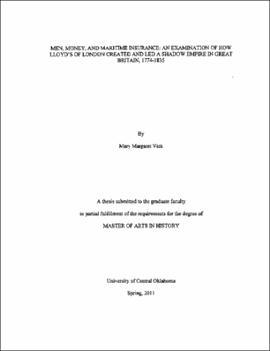| dc.contributor.advisor | Ice, Randal | |
| dc.contributor.author | Vick, Mary M. | |
| dc.date.accessioned | 2020-05-26T20:37:40Z | |
| dc.date.available | 2020-05-26T20:37:40Z | |
| dc.date.issued | 2011 | |
| dc.identifier.other | (AlmaMMSId)9978549585202196 | |
| dc.identifier.uri | https://hdl.handle.net/11244/324680 | |
| dc.description.abstract | The purpose of this study is to identify and explore the significance of commercial enterprise in the expanding British Empire during the eighteenth and nineteenth centuries. Historical records have repeatedly revealed how the prestigious insurance firm supported the growing Royal Navy's efforts. As a strong national identity successfully merged with commercial enterprise, each separate entity subsequently complimented and advanced each other through patriotic, philanthropic, and political activities. It is possible to trace the empire's increased oceanic trade activities, and resulting wealth through the records generated by the premier maritime insurance source in Britain, Lloyd's of London. Although the members at Lloyd's of London certainly amassed fortunes both for their individual corporations and for personal profit in the period between 1774 and 1835, their collective contributions and achievements remained largely obscured from public scrutiny. Despite these circumstances, three Lloyd's men, Sir Brook Watson, John Julius Angerstein, and Joseph Marryat certainly represented a formidable force within the overarching maritime culture in England by creating their own shadow empire. While helping to fashion Great Britain's oceanic commercial trade ventures, Lloyd's of London assembled a magnificent structure of authority by mimicking the empire within which they labored. Utilizing the members' finely honed skills, this famous corporation functioned with expertise at such a high level that no competitor succeeded in breaking their global, empirical grasp on economic, political, and social principles. Historical records have repeatedly revealed how Lloyd's of London, a prestigious insurance firm, supported the growing Royal Navy's efforts. This study traces the meteoric rise of the powerfully connected men affiliated with Lloyd's of London and how their work affected the business environment of Britain. On-site research conducted in London occurred at various institutions: archival research in the Admiralty records at the PRO at Kew, the Lloyd's of London manuscript collection located at the Guildhall Library at the London Metropolitan Archives, and British Library manuscripts collection. Additional sources included parliamentary papers, published primary sources including observations of MPs, historical newspapers, speeches, pamphlets, and photographic, statistical, and biographical data. Archival sources in London supporting the activities of Lloyd's included manuscripts from the committee chair, observations on marine trade issues, and researched risk management methodology. | |
| dc.rights | All rights reserved by the author, who has granted UCO Chambers Library the non-exclusive right to share this material in its online repositories. Contact UCO Chambers Library's Digital Initiatives Working Group at diwg@uco.edu for the permission policy on the use, reproduction or distribution of this material. | |
| dc.subject.lcsh | Insurance companies, British | |
| dc.subject.lcsh | Imperialism | |
| dc.title | Men, money, and maritime insurance : an examination of how Lloyd's of London created and led a shadow empire in Great Britain, 1774-1835. | |
| dc.type | Academic theses | |
| dc.contributor.committeeMember | Evans, Cheryl | |
| dc.contributor.committeeMember | Sheetz-Nguyen, Jessica A. | |
| dc.contributor.committeeMember | Webb, Gail | |
| dc.thesis.degree | M.A., History | |
| dc.identifier.oclc | (OCoLC)ocn840799406 | |
| uco.group | UCO - Graduate Works and Theses::UCO - Theses | |
| thesis.degree.grantor | Jackson College of Graduate Studies | |
